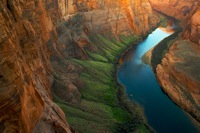Difference between revisions of "River"
m (Text replacement - "http://nordan.daynal.org" to "https://nordan.daynal.org") |
m (Text replacement - "http://" to "https://") |
||
| Line 3: | Line 3: | ||
==Etymology== | ==Etymology== | ||
[https://nordan.daynal.org/wiki/index.php?title=English#ca._1100-1500_.09THE_MIDDLE_ENGLISH_PERIOD Middle English] rivere, from Anglo-French, from Vulgar Latin *riparia, from [[Latin]], feminine of riparius riparian, from ripa bank, shore; perhaps akin to [[Greek]] ereipein to tear down | [https://nordan.daynal.org/wiki/index.php?title=English#ca._1100-1500_.09THE_MIDDLE_ENGLISH_PERIOD Middle English] rivere, from Anglo-French, from Vulgar Latin *riparia, from [[Latin]], feminine of riparius riparian, from ripa bank, shore; perhaps akin to [[Greek]] ereipein to tear down | ||
| − | *Date: [ | + | *Date: [https://www.wikipedia.org/wiki/14th_Century 14th century] |
==Definitions== | ==Definitions== | ||
*1 a : a natural [[stream]] of [[water]] of usually considerable [[volume]] | *1 a : a natural [[stream]] of [[water]] of usually considerable [[volume]] | ||
| Line 12: | Line 12: | ||
A '''river''' is a [[natural]] watercourse, usually freshwater, [[flowing]] toward an [[ocean]], a [[lake]], a sea, or another river. In a few cases, a river simply [[flows]] into the ground or dries up completely before reaching another [[body]] of [[water]]. Small rivers may also be called by several other names, including [[stream]], creek, brook, rivulet, and rill; there is no general rule that defines what can be called a river. An exception to this is the [[stream]]. In some countries or [[communities]] a stream may be defined by its size. Many names for small rivers are specific to geographic location; one example is Burn in Scotland and North-east England. Sometimes a river is said to be larger than a creek, but this is not always the case, because of vagueness in the [[language]]. | A '''river''' is a [[natural]] watercourse, usually freshwater, [[flowing]] toward an [[ocean]], a [[lake]], a sea, or another river. In a few cases, a river simply [[flows]] into the ground or dries up completely before reaching another [[body]] of [[water]]. Small rivers may also be called by several other names, including [[stream]], creek, brook, rivulet, and rill; there is no general rule that defines what can be called a river. An exception to this is the [[stream]]. In some countries or [[communities]] a stream may be defined by its size. Many names for small rivers are specific to geographic location; one example is Burn in Scotland and North-east England. Sometimes a river is said to be larger than a creek, but this is not always the case, because of vagueness in the [[language]]. | ||
| − | A river is part of the [ | + | A river is part of the [https://en.wikipedia.org/wiki/Hydrological_cycle hydrological cycle]. [[Water]] within a river is generally collected from precipitation through [[surface]] runoff, groundwater recharge, springs, and the release of stored water in natural ice and snowpacks (e.g., from [https://en.wikipedia.org/wiki/Glacier glaciers]).[https://en.wikipedia.org/wiki/River] |
[[Category: Earth Science]] | [[Category: Earth Science]] | ||
Latest revision as of 02:37, 13 December 2020
Etymology
Middle English rivere, from Anglo-French, from Vulgar Latin *riparia, from Latin, feminine of riparius riparian, from ripa bank, shore; perhaps akin to Greek ereipein to tear down
- Date: 14th century
Definitions
- b : watercourse
- 2 a : something resembling a river <a river of lava>
- b plural : large or overwhelming quantities <drank rivers of coffee>
Description
A river is a natural watercourse, usually freshwater, flowing toward an ocean, a lake, a sea, or another river. In a few cases, a river simply flows into the ground or dries up completely before reaching another body of water. Small rivers may also be called by several other names, including stream, creek, brook, rivulet, and rill; there is no general rule that defines what can be called a river. An exception to this is the stream. In some countries or communities a stream may be defined by its size. Many names for small rivers are specific to geographic location; one example is Burn in Scotland and North-east England. Sometimes a river is said to be larger than a creek, but this is not always the case, because of vagueness in the language.
A river is part of the hydrological cycle. Water within a river is generally collected from precipitation through surface runoff, groundwater recharge, springs, and the release of stored water in natural ice and snowpacks (e.g., from glaciers).[1]
